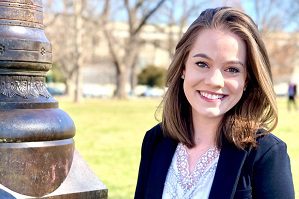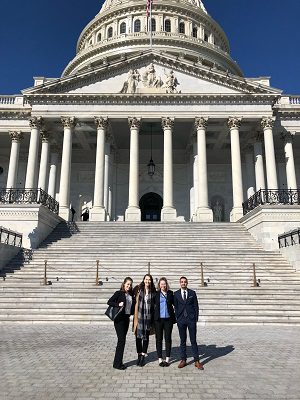Katie Napier, ASCLS Developing Professionals Forum Region IV Representative
 |
 |
| Katie Napier and fellow students from the University of Cincinnati Medical Laboratory Science program pose in front of the U.S. Capitol during the 2019 Legislative Symposium in Washington, D.C. |
When I’ve asked my classmates at the University of Cincinnati how they knew about the medical laboratory science (MLS) major, they often say they didn’t know about it until years into their college career. Many of the students in our program transferred from another science major or even completed a bachelor’s degree and then realized that medical laboratory science was more fitting for their interests and came back to school for the certificate program. Why aren’t students hearing about the laboratory science profession before choosing their college?
I realized the magnitude of laboratory scientist shortages when I attended the 2019 Legislative Symposium in Washington, D.C. One of the issues we discussed and brought to Capitol Hill was an attempt to establish a program of scholarships and loan repayment for students in exchange for obligated service in a shortage area. These programs and scholarships would be similar to the programs already in place for doctors and nurses. I have been thinking about this particular issue since I returned home from the Legislative Symposium and how I could personally advocate for my profession. As a developing professional in this allied health field, I feel that I have an obligation to be an advocate for a career about which I am excited. So, what have I been doing to be a voice of the profession, and what can we all do to reach future medical laboratory scientists before they have invested too much time and money into superfluous education?
Each year the Laboratory Legislative Symposium provides an excellent opportunity for medical laboratory and allied health professionals to raise awareness among government officials about the major issues we are faced with and attempt to lobby for change. This is an excellent way to raise visibility of the medical laboratory science profession. We can also raise visibility by getting involved within ASCLS. Attending the Joint Annual Meeting or any state meeting is an easy way to network with other professionals and stay up to date with current events and issues within the profession.
“It’s imperative that we all stay up to date with relevant issues, get involved in our communities, get involved in ASCLS, and take pride in our profession, as it is an essential part of providing quality medical care.”
Something else we can also do to advocate for our profession—and something I plan to implement—is speaking to teens in high school about medical laboratory science. As I mentioned before, many of my classmates didn’t know about MLS until years into their college career. If we can educate students about the profession before they make their college decisions, it would have a great impact on the interest in the field. That being said, with the shortages in clinical sites and programs that offer an MLS degree, it will take time before the clinical sites and hospitals can accommodate a high influx of students.
From my perspective, outlook for the career is looking promising. In our program, there has been increased interest from year to year in the major, as well as the certificate program. My short involvement thus far in ASCLS has taught me just how important advocacy is, not only with law-making officials, but also with prospective students. I am looking forward to participating in the 2020 Legislative Symposium, as well as continuing my involvement with ASCLS at the Ohio Collaborative Laboratory Conference and the ASCLS Joint Annual Meeting in Louisville. It’s imperative that we all stay up to date with relevant issues, get involved in our communities, get involved in ASCLS, and take pride in our profession, as it is an essential part of providing quality medical care.
Katie Napier is a senior in the medical laboratory science program at the University of Cincinnati.
